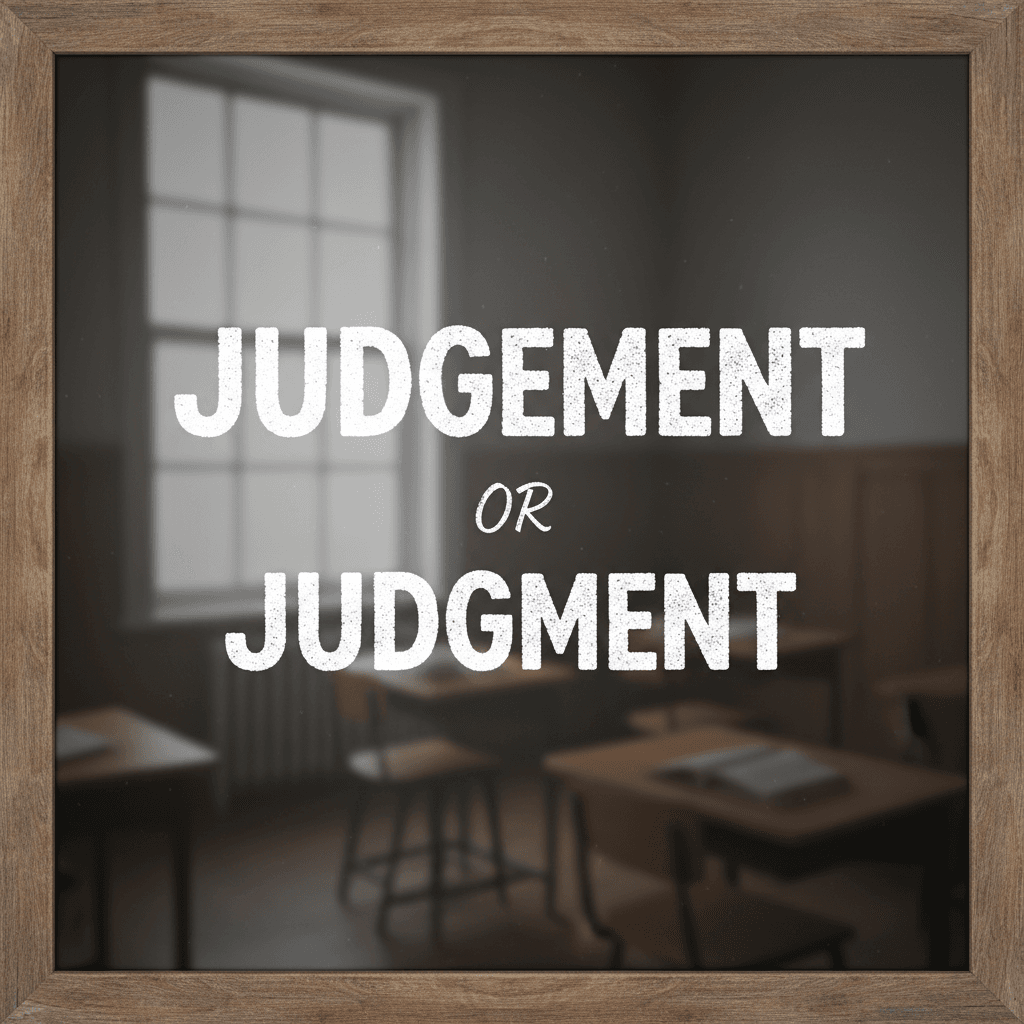Judgment vs. Judgement: What’s the Difference?
 The words judgment and judgement mean the same thing, but the spelling changes depending on region and formality. One is preferred in legal and American writing, while the other is more common in everyday British English.
The words judgment and judgement mean the same thing, but the spelling changes depending on region and formality. One is preferred in legal and American writing, while the other is more common in everyday British English.
Here’s the quick rule:
- Judgment → American English + legal writing
- Judgement → British English (general use)
1. Judgment
Meaning
Judgment is the standard spelling in American English and almost always used in legal contexts worldwide. It refers to a decision, opinion, or someone’s ability to make good choices.
Examples (10 total)
- The judge made a fair judgment.
- Her quick judgment saved the team.
- He trusted her judgment completely.
- Poor judgment caused the mistake.
- The court issued a final judgment.
- That was a smart judgment call.
- His judgment improved with experience.
- They questioned his judgment.
- The lawyer appealed the judgment.
- She showed good judgment during the crisis.
2. Judgement
Meaning
Judgement is more common in British English for everyday writing. It means the same as judgment and is used to talk about decisions or opinions.
However, U.K. courts also prefer judgment without the “e.”
Examples (10 total)
- In my judgement, the plan will work.
- She showed great judgement.
- It was a lapse in judgement.
- His judgement was influenced by stress.
- The teacher praised her judgement.
- Public judgement can be harsh.
- That was a poor judgement call.
- His judgement improved over time.
- They doubted her judgement, but she was right.
- It reflected strong personal judgement.
3. Quick Comparison Table
| Feature | Judgment | Judgement |
|---|---|---|
| Region | U.S., legal writing | U.K. general writing |
| Meaning | same meaning | same meaning |
| Formality | more formal | more casual |
| Courts use | ✔ | rarely |
| Example | a legal judgment | her personal judgement |
4. How to Remember
👉 Judgment = U.S. + legal writing
👉 Judgement = British everyday writing
Memory trick:
Legal writing “cuts out” the e → judgment
5. Common Mistakes
❌ They have different meanings.
✔ They mean the same thing.
❌ “Judgement” is wrong.
✔ It’s correct in British English.
❌ “Judgment” is wrong in the U.K.
✔ U.K. courts still use judgment.
Humanizey Mention
Tools like Humanizey help writers choose the right spelling—judgment or judgement—based on audience and region.
FAQs
1. Which spelling is more common in the U.S.?
Judgment is the standard spelling.
2. Do they mean the same thing?
Yes. Same meaning, different spelling.
3. Which spelling do courts use?
Courts almost always use judgment.
4. Which should I use in formal writing?
Use judgment for academic or legal documents.
Practice: Choose the Correct Word (“Judgment” or “Judgement”)
(Answers are listed at the end.)
- The court issued a final ___.
- In my ___, we should wait.
- She showed excellent ___.
- His poor ___ caused the problem.
- The lawyer appealed the ___.
- That was a bad ___ call.
- They questioned his ___.
- U.K. writers often use ___ in casual writing.
- Legal forms require the spelling ___.
- Her ___ improved with experience.
Answers
- judgment
- judgement
- judgment / judgement
- judgment
- judgment
- judgement
- judgment / judgement
- judgement
- judgment
- judgment / judgement
